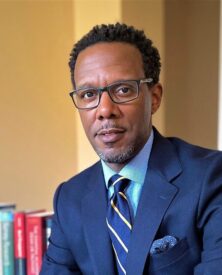UC Berkeley scholars say the economy, sexism and conspiracies fueled Trump’s reelection
Donald Trump's victory was made possible by a confluence of factors and will have implications domestically and abroad that "are hard to overstate," UC Berkeley experts say.

Julia Demaree Nikhinson via AP
November 6, 2024
Former President Donald Trump has decisively won reelection to the White House, a political outcome that began reverberating around the globe in the hours after the polls closed Tuesday. After polling for weeks had shown a too-close-to-call race that might take days to conclude, Trump’s clear win struck many as a shock.
Analysts will likely need years to fully understand the forces that drove his return to power. But on the day after, top UC Berkeley scholars offer a sharp and sometimes unsettling assessment of the dynamics at play. Some cite Trump’s appeal to white voters, who looked past the insurrection against democracy on Jan. 6, 2021. One says that Americans are not ready to trust a woman with presidential power. And others say Trump’s victory reflects a global rage against political leadership and warn that it could help fuel a new era of global instability.
Below, read a full range of responses to the election results by UC Berkeley experts in political science, sociology, international relations and other fields.
What is your main takeaway from the election results that will bring Donald Trump back to the White House?

There are many takeaways from the election results. But the most important implication is that just four years after the Jan. 6 insurrection, former President Trump will be back in the White House — now surrounded by staff and agency leaders who will be more committed to him both personally and to his agenda.
With a Republican Senate (and likely House), he will be able to make some major legislative changes, especially when it comes to taxes. But as head of the executive branch, he will be in a position to act unilaterally on a host of other issues, pushing the limits of presidential power. With a supportive Supreme Court, the implications for policy and governance are hard to overstate.
— Eric Schickler, political scientist and co-director of the UC Berkeley Institute of Governmental Studies (IGS)
You’ve spoken about how economic insecurity led white men, in particular, to support Trump and stick with him. What does his defeat of Kamala Harris tell you about the enduring power of that demographic’s political beliefs and power?
I see the outcome of the presidential election fundamentally as an expression of anger about the state of the economy. As the saying goes, “It is the economy, stupid.” The economy is working well for some groups of people, to be sure, but there are different economies for different sets of people.

But it’s also not just “the economy, stupid.” I would never discount the racist and misogynist rejection of a Black and South Asian woman; the deliberately circulated fears and lies that fed the wounded racial and masculine identity of particular demographic groups; the willingness of some immigrants to shut the door behind them; and the bogey figure of “trans” that came to stand in for historic changes that were hard to grapple with. Neither would I discount the effect of the global conflicts in which America is implicated.
But at the end of the day, I do not believe that these results would have occurred if large populations of Americans did not worry about the cost of groceries, utilities and rents. The success of a political party depends on its responsiveness to its constituents — not just as a pool of votes, but also to the social and political movements through which they express themselves. There are lessons here that the Democratic Party has, unfortunately, consistently failed to heed.
— Raka Ray, dean of UC Berkeley Social Sciences and professor of sociology and South Asian studies
Before the election, a Berkeley IGS Poll found that even in California, support for Kamala Harris was significantly less than Joe Biden’s 2020 support among Asian American and Latinx voters, and particularly men in those communities. An exit poll this morning showed that Latinx men really moved toward Trump. Do you have any insights as to why so many in these communities turned from Harris or were drawn to Trump?
There has been much discussion this election about growing support for Trump among non-white voters, but little focus on the ongoing and growing support for Trump among white voters, particularly white women. Many pundits assumed white women would turn out for Harris because of their concerns about reproductive justice. Yet, we must remember that white women have only voted Democratic once in the past 50 years: That was in 1996, in favor of Bill Clinton.

Looking at voters of color, although it is true that Latine men seemed to be more supportive of Trump this cycle, I would be very skeptical of exit poll results that are significantly different from high-quality survey results taken shortly before the election. Exit polls have many methodological problems and are particularly bad at identifying trends within ethno-racial subpopulations. In October, Latine polling by Equis Research found about 55% Latine support for Harris in the battleground states, with stronger support among Latina women. There is no reason to believe things looked significantly different on Election Day.
A more useful question is to consider the reasons underlying Trump’s appeal to voters. Many pundits have questioned how voters could support Trump in spite of his racist and misogynist statements. I would argue that many voters supported him because of these assertions. It was not only that many saw those controversial words as proof of his willingness to speak the “truth.” For some voters, Trump’s words made them feel powerful, gave them someone to blame for their problems, and made them feel confident he could fix them.
— Lisa García Bedolla, political scientist, vice provost for graduate studies and dean of the Graduate Division
Democrats have nominated women as their presidential candidates twice in the past eight years, and both have lost. To what extent do you think gender played a role in the outcome, especially this year?
Among the many sociocultural factors affecting presidential elections, gender has been a defining dynamic for the last three cycles, with voters facing choices between male and female candidates for both presidential and vice presidential positions. The gender dynamics of the most recent election were intensified by contentious debates over reproductive rights and their disproportionate impact on women, as well as by one candidate’s explicit embrace of hypermasculinity.

Two fundamental questions emerged: whether voters would choose between dominant versus prestigious leadership styles, and whether America was ready to advance toward greater gender equality by electing a woman to the world’s most powerful position. The results appear to confirm that most American voters still implicitly endorse traditional gender hierarchies in political leadership, maintaining a system where men hold predominant power and authority.
The voting patterns across these recent elections reflect deeper societal dynamics around gender and power, suggesting that our society remains more comfortable with women in supporting roles rather than as the primary decision-maker, metaphorically preferring men at the helm while women occupy the passenger seat. While Americans may support women’s advancement in principle, electoral behavior continues to reflect weak implicit (and explicit) associations between the concepts of women and power.
— Laura Kray, psychologist and director of the Center for Equity, Gender, and Leadership at the Haas School of Business
Why is hate and fear-mongering so motivating? Why did the GOP choose to capitalize on anti-trans hate in this election?
Throughout their presidential campaign, the Republican Party used — which is to say produced — an atmosphere of anti-trans hate to move people to the polls, and it seems to have worked. For years, a coalition which includes many self-identified conservatives, along with their liberal co-conspirators, have seeded a trans panic on the local level, whether at school boards, libraries, sports fields and medical facilities.

As I’ve argued in my most recent book, anti-trans hate is so wildly successful because it makes the public fearfully obsessed with trans people. Ironically, many conservative commentators spend more hours per day talking about gender than I do as a professor who studies it. Of course, much of what they say is factually incorrect. However, they own the means of distribution, and so it is received as truth.
That said, anti-trans antagonism is a bipartisan affair. While the Republicans have been loud and clear about their will to eradicate trans people, Democrats have remained mostly silent. One could speculate that they fear the vitriol many of us survive, or perhaps they passively agree. Either way, it is illustrative of the Democratic Party’s move further toward the right which helped them lose the election.
— Eric A. Stanley, Haas Distinguished Chair in LGBT Equity
Was there a flaw, or a failure, in the Democrats’ strategy or tactics in this election that contributed to Trump’s win and Harris’ defeat?
Harris launched strong, but after her great performance in the Sept. 10 debate, she and her party reverted to their ultra-risk-averse, low-dominance ways.

Harris largely dropped the hard-edged, provocative spirit of her DNC speech and the debate. In interviews, she offered evasive, scripted, chutzpah-free answers, creating the impression that she was just a typical politician. Instead of staying on offense and limiting their attention to Trump largely to ridiculing him, the Democrats fell back on their timeworn, futile tactic of ceding the spotlight to him, repeating his outrageous statements and enjoining everyone to be fearful and offended.
Rather than forcefully celebrating the roaring economy, Harris remained wedded to the 21st century Democrats’ delusion that you score more points — even when the economy is sizzling and you’re in power — by expressing sympathy for supposedly suffering voters. Harris could have honored Americans’ bootstrap mentality and leveraged their patriotism, casting her program as a pro-growth dynamo that would send wages and corporate profits soaring and ensure that the American economy continues to leave the rest of the world in the dust.
Instead, she played Santa Claus: a $50,000 tax credit for first-time business starters, $25,000 for first-time homebuyers, a $6,000 credit for newborns.
Harris is a strong leader and a diehard patriot, and Trump is a coward at heart and a traitor to boot. Tragically, the Democrats neglected to show it.
— M. Steven Fish, political scientist, author of “Comeback: Routing Trumpism, Reclaiming the Nation, and Restoring Democracy’s Edge”
The reflexive, morning-after worry is that U.S. democracy will literally and directly be at risk in a second Trump term. Is that a valid concern?
Democratic institutions in the U.S. continue to be under strain. It is a challenge for any country to have a national executive who has attempted to subvert a previous election.

One concern is that the executive branch will use its authority to influence the administration of the 2026 midterms and 2028 presidential elections. A second concern is that the reelection of a politician who has attempted election subversion will incentivize and embolden other politicians to threaten the rule of law and peaceful transfer of power. A third concern is that the “stop the steal” conspiracy about the 2020 election will continue to be popular, leading to further distrust in U.S. election administration.
This election has made clear that a majority of Americans are willing to vote for a candidate who threatens the rule of law, a serious concern of the Founders.
— Jacob Grumbach, political scientist, leader of the Democracy Policy Lab at the Goldman School of Public Policy
To what extent do you feel conspiracy theories or conspiratorial thinking shaped the outcome of this election? Why does conspiracy thinking have such power over much of the electorate?
The United States has always been a nation of conspiracy theorists, and once again we will have a conspiracy theorist-in-chief. American politics have long been shaped by fears of conspiracy, from the colonial-era Illuminati to Henry Ford’s antisemitism. In 1965, historian Richard Hofstadter critiqued the “paranoid style” of demagogues and populists on the (mostly right-wing) fringe as the price society paid for consensus at the “vital center.”

But in the post-9/11 era, these fringes have conquered whatever remained of liberal society. Trump began his political rise with the “birther” conspiracy. His Muslim ban and border wall were not just nativist slogans, but solutions to the perceived threat of infiltrators seeking to “replace” white voters. And there was the “big lie” of 2020, in which massive voter fraud (now magically vanquished) prevented his re-election.
This new administration will be staffed with conspiracy theorists like Stephen Miller and RFK Jr., who promise to deliver Trump’s vengeance. Within the grip of paranoia, every accusation is both projection and a confession, and those who imagine themselves victims of conspiracy tend to conspire against others. But now, instead of this being a fringe fantasy, Trump’s authoritarian, if not openly fascist, conspiracy theories will be backed by the might of the American Empire.
— Michael Mark Cohen, associate teaching professor of American studies and African American studies
Put Trump’s victory in an international context: In tone and substance, does it parallel upheavals happening in other parts of the world?
Donald Trump’s election fits a pattern of populist-nationalist insurgencies that have roiled democracies in the decade since Britain’s choice for Brexit. Populist-nationalists, as I would call them, have won elections in Europe, Latin America and South and Southeast Asia. Their insurgencies reflect impatience with incumbents and prevailing policies, but not with democracy itself. Democracy encompasses many varieties of politics, after all, and what we see in this populist-nationalist groundswell is a majoritarian reaction against the liberal-democratic synthesis that achieved broad global influence in the late 20th century.

Put in broader perspective, the efforts of populists like Trump to “take back control,” reestablish borders and draw hard lines between insiders and outsiders aren’t novel; they’re doing what nationalists do. Liberals (like me) lament the populist-nationalist phenomenon, but we should hope — now that Trump has won — that populist-nationalism brings some benefits, especially for those Americans who have borne the brunt of globalization’s downside.
My deeper worry is for world order: Liberal policies and commitments sustained a tolerable peace and bolstered global prosperity over the past half-century. If history is any guide, the rise of populist-nationalism risks escalating international strife.
— Daniel J. Sargent, historian and co-director of the Institute of International Studies
Globally, incumbents have recently experienced voters’ anger — it’s not just a U.S. phenomenon. In some cases, this seems to reflect an impatience with democracy itself. How would you explain this global pattern? Are there conditions or characteristics common across countries?

It will take some time before we know exactly whether this election is similar to other countries’ experiences. Populism, frustration with inflation, ethnonationalism, and politician-led manipulation of voter fears about their fellow citizens are common to many elections around the world in recent years.
Is this why Trump won? They are all potentially contributing factors, but I would hesitate before concluding that impatience with democracy itself is a global trend.
Rather, I see the global trend as one in which some of the institutional support structures for democratic processes — a strong and independent media at local and national levels, strong political parties, the massive increases in disinformation without any effective counter to it — weaken and make it easier for both populist and nativist politicians to thrive.
— Susan D. Hyde, political scientist and co-director of the Institute of International Studies
What did you learn from the election? And what does the future hold?
This presidential campaign illuminated the tensions between the ideals of American democracy and the human motives that can get in its way.

Former President Trump and current Vice President Harris provided clear contrasts in experience, capacity, enthusiasm, optimism and compassion. While Harris provided policy details and offered bipartisan appeals, Trump cast a dark picture of criminal immigration, demonization and a country in decline. To the amazement of many, this appeal worked. One can only conclude that, for a majority of Americans, democracy is less about people and more about power — and who ought to hold it.
A few points from exit polling stand out. While Harris won the women’s vote overall, white women, especially those who are suburban, married or who have no college degree, favored Trump. And while she won voters of color overall, Native Americans and Latino men favored Trump. The implication is that a majority of Americans may still have concerns about a president being a woman, person of color, or both.
It’s important to keep in mind that the presidential election was but one contest on a ballot of many decisions for voters. While former President Trump won a majority and the Electoral College, Democrats won statewide offices in the challenging states of Arizona, North Carolina, Wisconsin and Michigan.
Arizona’s constitutional right to abortion amendment passed overwhelmingly, as did Alaska’s minimum wage increase and sick leave requirement. The 2024 elections also yielded new African American female senators from Delaware and Maryland, and the first transgender representative and LGBTQ+ representative from the South. The point is that the election revealed the dynamism and range of American democracy, but also the continuing racial and gender criteria that inform how people decide their leadership.
— David C. Wilson, dean of the Goldman School of Public Policy
Kara Manke and Anne Brice contributed to this report.